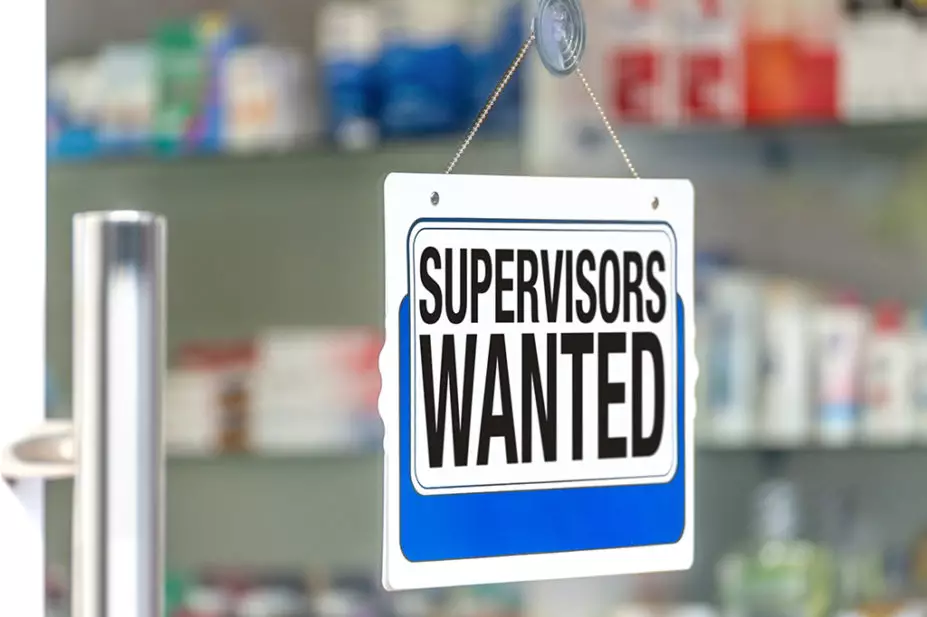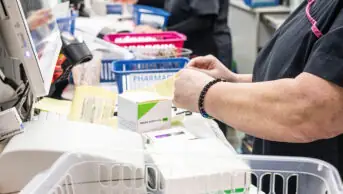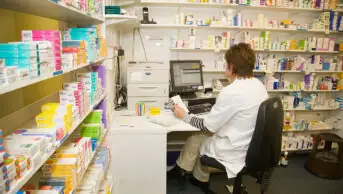
Shutterstock.com / MAG
An unparalleled drive to train more pharmacists as independent prescribers (IPs) has begun.
According to the General Pharmaceutical Council (GPhC), there are — as of April 2022 — 11,847 pharmacist IPs in Great Britain; however, all nations recognise that this number will not be enough to meet demand.
The Welsh government wants each community pharmacy to have an IP pharmacist by 2030, while the Royal Pharmaceutical Society (RPS) in Scotland’s ‘Pharmacy 2030’ vision document, published in January 2022, says: “By 2030, the vast majority of community pharmacists will be independent prescribers.”
By 2026, pharmacists as IPs will be the default: from that year onwards, everyone graduating with an MPharm will have qualified as an IP at the point of registration.
Stumbling blocks
However, to make this happen, three things need to be in place: first, pharmacists themselves need to want to expand their skills. Survey results from more than 400 newly qualified pharmacists published in 2012 supports that, revealing that the vast majority (86%) were interested in becoming a prescriber, and this figure is very likely to have increased over the past decade.
Second, funding. In December 2021, the Welsh government said that it would allocate £3m to pharmacy training in Wales, including 200 funded independent prescribing places and a £3,000 bursary for community pharmacists. Health Education England (HEE) announced in January 2022 that it would fund 327 places on pharmacist independent prescriber courses, looking eventually to deliver 3,000 pharmacist IP training places by 2023.
The rate limiting factor is not the availability of the education aspect — it’s the availability of someone to do the 90 hours of training
Graham Stretch, chief pharmacist at Argyle Health Group and clinical director at Brentworth Primary Care Network
Similarly, in March 2022, the Scottish government announced funding for 165 places on pharmacist IP courses in the first quarter of 2022, in addition to the 240 places announced in 2021. Then, in May 2022, it went even further with confirmation from NHE Education for Scotland (NES) of funding for an additional 186 places.
To facilitate this push for training, in May 2022 the GPhC changed its eligibility requirements for IP training courses with the aim of meeting demand for more pharmacist IPs, removing the requirement to be on the register for two years before undertaking IP training.
The third hurdle to overcome in is the need for adequate mentoring and support for pharmacists going through their training, and it is here where things are becoming a bit unstuck.
Experiential learning
Each IP trainee has to find someone willing to supervise the hands-on or ‘experiential learning’ part of their training to act as their designated prescribing practitioner (DPP). This can be a pharmacist, doctor, nurse or dentist who is an IP and who would normally have at least three years’ prescribing experience. They must also meet the standards set out in the RPS’s ‘Competency framework for designated prescribing practitioners’ (see Box).
Box: What skills does a designated prescribing practitioner need?
A designated prescribing practitioner (DPP) should:
- Be experienced as a prescriber in a patient-facing role, normally with at least three years’ recent prescribing experience;
- Show up-to-date patient-facing, clinical and diagnostic skills, as well as evidence of demonstrating competence in an area of practice relevant to the trainee;
- Demonstrate knowledge of the scope and legal remit of non-medical prescribing for the trainee’s profession;
- Demonstrate clinical leadership through their practice;
- Be open, approachable and empathetic;
- Create a positive learning culture through their practice;
- Have experience or training in teaching and/or supervising in practice, with knowledge of different teaching methods to facilitate learning in practice and adapt to individual student needs;
- Facilitate learning by encouraging critical thinking and reflection.
Source: Royal Pharmaceutical Society’s ‘A Competency Framework for Designated Prescribing Practitioners‘, 2019
The role of a DPP is both mentor and supervisor, and trainees need to have a DPP in place before signing up to a training course. They supervise a period of experiential learning and are meant to have regular, documented meetings with the trainee to ensure their progress is on track. Then, at the end of the training period, the DPP provides formal confirmation to the course provider that the trainee has met all required standards and is suitable to be an IP.
It used to be that only doctors could supervise IP training, and they were called designated medical practitioners (DMPs). But now pharmacists and some other prescribing professionals can also do it, and now anyone supervising IP training is called a DPP.
However, experts have told The Pharmaceutical Journal that they are worried that a shortage of DPPs is holding back IP training, particularly in community pharmacy.
Graham Stretch, chief pharmacist at Argyle Health Group and clinical director at Brentworth Primary Care Network (PCN), who also works as a DPP, says: “There are probably many community pharmacists who would like to do [IP training], given an opportunity. But the rate limiting factor, generally speaking, is not the availability of the education aspect — it’s the availability of someone to do the ‘90 hours of training [and] face-to-face training’ aspect of it.”
A trainee pharmacist prescriber is required to undertake a minimum of 90 hours of “supervised practice” and, although the DPP does not have to supervise this all directly, they must confirm that the pharmacist has completed these hours to the course provider.
While Stretch said he was pleased to see that HEE has commissioned 3,000 IP training places, he warned that without equal or more emphasis on DPPs, “we are setting this up to fail and frustrate lots of people who are really keen to do it”.
“[The delivery of] 3,000 places is great, but you need to find 1,500 DPPs or DMPs to go with it. Otherwise, you’re going to be all dressed up with nowhere to go.”
There is no incentive for that GP practice to take you on, or that prescriber to supervise you, unless you’re going to work with them in the future
Noma Al-Ahmad, managing director of ProPharmace
Similarly, Noma Al-Ahmad, managing director of ProPharmace, a pharmacy training provider, said: “To put it simply, there isn’t enough capacity.
“There is no incentive for that GP practice to take you on, or that prescriber to supervise you, unless you’re going to work with them in the future. So you’re really waiting for a pharmacist DPP or a DMP to do it as a favour or as professional development.”
The shortage of DPPs is going to become an increasing problem as pharmacists begin to take their IP exams. Papers presented to a General Pharmaceutical Council (GPhC) meeting in November 2020 referred to new initial education and training standards for pharmacists, warning that “there may be an insufficient number of DPPs available to supervise and sign off trainees in the Foundation training year”.
It is not easy to track DMP or DPP figures, as they are not held centrally. However, according to a paper published in the International Journal of Pharmacy Practice in April 2022, out of 97 respondents, only 19.6% — which included directors of pharmacy, prescribing leads and IP-qualified community pharmacists in Scotland — thought there was sufficient DPP capacity to support the aspirations of the Scottish government.
Funding gap
There is patchy funding for DPPs, with the majority doing the role unpaid. As such, the amount of time it takes can be hard to justify without reimbursement.
Emily Turner, a pharmacist with NHS Leeds clinical commissioning group, recently took on a DPP role and is currently mentoring one pharmacist through their IP training.
“We have around 70 PCN pharmacists in Leeds, plus more than 20 GP-based pharmacists, a majority of whom are or will be completing their prescribing qualification either currently or in the near future. Each trainee requires 90 hours supervised practice over four to six months, which is a significant time pressure on an already overwhelmed system,” she says.
Stretch added that being a DPP is “time consuming; it’s 90 hours of supervision”.
“So it seems to me that if I’m going to persuade the partners at my PCN that this is something that they want to do, then naturally we need to backfill my time. Because I’m no longer doing a clinic: instead I’m doing something else, which is not without value, but nowhere near as much work that would normally get done in that time.
“There needs to be compensation and backfill for that [time], in order to be able to persuade the decision makers in your in your organisation that this is a worthwhile thing,” he explains.
There is a shortage of DMPs, too. Turner says that GPs “are overrun” with requests to be DMPs from other professions, such as nurses, so it is vital to ensure alternatives are available.
“One important way of doing this is by increasing the number of professions who can undertake the role of DPP,” he said.
Al-Ahmad has even heard of some examples where IPs in training are paying to access DPP support. “We’ve heard some [DPPs] are charging fees of a few thousand pounds, because they’re saying it’s a lot of time and commitment to be able to carry out that role.
“Even the pharmacist who wants the DPP, if they hit a brick wall where they can’t find a DPP or a DMP to supervise them they’re willing to pay to get it done.”
In its policy on pharmacist IPs, published in 2021, the RPS said: “Training to support pharmacists to become DPPs should be funded and accessible to all that are eligible to fill the roles.
“Pharmacists must be supported to take on the role of DPP as part of their clinical leadership and a multiprofessional approach to clinical learning.”
Al-Ahmad agrees. “There are a lot of requirements, a lot of paperwork [involved in becoming a DPP]. You have to be quite experienced and skilled to carry out the job, therefore we feel that it should be funded, alongside the funding for independent prescribing courses.”
There is scope to increase the number of pharmacist DPPs, in particular. Results from a HEE survey of 204 IP pharmacists across acute trusts in London and the south east of England, presented at the Clinical Pharmacy Congress in May 2022, revealed that only 2% of them were working as DPPs.
Nevertheless, there is work being done to improve these numbers. For example, Community Pharmacy Scotland (CPS) has earlier in 2022 launched a project looking at how best to support DPPs in Scotland and, crucially, is providing pharmacy employers with a backfill payment for their time. Under the scheme, 16 DPPs across Scotland will be recruited to support two IP trainees each.
Amanda Rae, head of policy and development at CPS, explains: “The project will involve the community pharmacy DPPs working with their community pharmacy IP trainees and providing a short write-up on the operational process and aspects of the programme.
“This will be used to produce a key facts/guide to good operational practice to support future DPPs in community pharmacy. There may also be opportunities for CPS to work with other organisations to evaluate this work.”
The project is recruiting now and is hoping to report over the next year.
Increasing capacity
In its announcement of its changes to IP training requirements in May 2022, the GPhC said the preceding consultation also revealed concerns “around the limited number of DPPs available”.
As a result, it is working closely with the statutory education bodies in England, Scotland and Wales, as well as other stakeholders, to increase supervisory capacity.
“The GPhC is working … to explore innovative supervisory models to help make sure there is adequate supervision capacity (including DPPs) to supervise pharmacists undertaking IP training.”
A spokesperson for Health Education and Improvement Wales (HEIW) told The Pharmaceutical Journal that it is looking at DPP capacity as part of its initial education and training of pharmacists programme. “HEIW has already completed a piece of work to establish the current DPPs capacity in Wales and the potential for new DPPs,” they said.
“HEIW will identify the support required to grow the pool of people with the confidence and competence to take on a DPP role.”
Matt Aiello, national programmes lead for education reform at HEE, said that access to supervision is “recognised as a priority”.
“With respect to prescriber supervision, we are looking at how pharmacists and other prescribers can be encouraged to develop themselves as DPPs — to enable appropriate access to high-quality supervision, regardless of who the practitioner is or where they are based.”
A spokesperson for NHS Education for Scotland (NES) said: “We recognise there is a need to promote and support the DPP role. That’s why we are working with our relevant Scottish stakeholders to support and encourage appropriate pharmacists to take this on.”
Read more: No new funding for supervisors to support 3,000 pharmacist independent prescribing trainees
2 comments
You must be logged in to post a comment.



This is something which needs to be addressed and something I have been going on about for many years.
I graduated in 2013 but have been unable to get a DMP/ DPP during all this time. I have requested support from multiple general practices and CCGs within a 30 mile radius since 2016 but all have turned me down (ghosting, nepotism or demaninding more money than what I was earning in a month for the "privilege" of shadowing them for 90 hours a week).
THE GPhC and RPS really need to work together with IPSs and various bodies to come to some arrangement as it is ridiculous how thousands of pharmacists who can be great assets are being wasted
I am happy NHS Education and the GPhC is working to help pharmacist who are keen to become Independent Prescribers in getting a DMP or DPP by incentivising this role.
I have also asked few GPs and CCGs for support and the first question asked is about the incentive for them or the pratice.
I am looking forward to a positive outcome in this ongoing development.